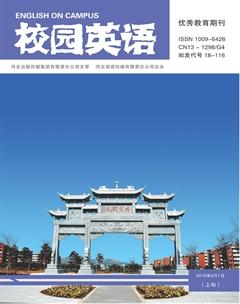Reasons for Cultural Connotation Differencesin Animal Idioms Between English and Chinese
胡梦莹
【Abstract】Being as two main language systems, Sino-Tibetan system and Indo-European system carry a wide variety of idioms or other set phrases.Owing to close and frequent contact with animal, a great multitude of English idioms about animal gradually have come into being. This paper will suggest different connotations behind the English and Chinese animal idioms and indicate that reasons causing cultural connotation differences in animal idioms.
【Key words】animal idioms; reasons; cultural connotation differences
I. Introduction
Among idioms in English and Chinese, different kinds of animal are adopted as vivid metaphors to express peoples feelings or to describe peoples activities. Both English and Chinese are rich in animal idioms which are used by people to express their feelings or to explain complicated rules.
II. Different Animal Idioms Connotations in English and Chinese Culture
Owing to different kinds of factors, people of English and Chinese inevitably add varied different connotations to the same animal words,such as “dog”.“A luck dog” refers to a kind of people who are so lucky and with no other derogatory significance in the western countries.In the Google, “Work as the dog”means somebody working so hard. The listed examples show that dog deserves high status . In contrast, the word “dog” in China carries with some derogatory meanings, as is reflected in old sayings like “act like a snob(狗眼看人低)”. Considering different animal idioms connotations,it is a good chance to indicate the reasons causing cultural connotation differences in animal idioms.
III. Reasons Causing Cultural Connotation Differences in Animal Idioms
1. Influences of geographical environment
As everybody knows that, Britain,as an island country does not share any land border with any other countries except the Republic of Ireland. In history, its navigation industry has a special passion and lure for water. Animal in the sea is often used to apply in idioms. In English, many animal idioms about fish constitute a large proportion, such as “have bigger fish to fry”, which means there are a lot of important and interesting things need to be done.However, China is an ancient country that living on agriculture. Cattle being as main animal act an extremely vital role in ancient agricultural life. In many Chinese idioms, people often describe a person who is working hard as “老黄牛”. People always compared industrious people with the good quality of bearing hardship without any complaint to ox.
2. Influences of religious belief
Religion being as a kind of cultural phenomenon, takes great impact on the historical development of nations. Without exception, language on the other side mirrors the religious culture.English culture as a main system of European culture is greatly influenced by Christianity for a long time. The Bible is not only the classic item of Christianity, but also the vital book to research the ancient English culture. In daily life, people like to quote a lot from the Bible to instruct their lives and behaviors. For example, “A cat may look at a king.” (位卑之人也有权利), which means obscure characters also have the same rights.However, Chinese culture was deeply influenced by Taoism, Buddhism and Confucianism,which persuades people bear with the kind-hearted mind and should not be allowed the thought of killing animal's life, there is an example “佛口蛇心”,which means that honeyed words but with the malicious intention.
3. Influences of cultural custom and history
Old English is ruled by the authority- Pope and the King for hundreds of years, so many idioms such as “the king and pope, the lion and wolf” (国王教皇,狮子豺狼) are including the sense of outrage and feeling of rebellion; In Chinas proverbs, there is an idiom to express the same meaning, such as the “Kings and bears often worry their keepers (伴君如伴虎)”. China is a time-honored country which owns with 5000 years cultural history and tradition. In ancient China, the King is regarded as a dragon, so correspondingly, the Queen is considered as a phoenix, so there are some idioms about it,for example,“ To hope one's children will have a bright future”(望子成龙或望女成凤).
References:
[1]Wales,K.1986.Northern English:A Social and Cultural History.London:Cambridge University Press.
[2]Yang,C.2011.Comparative Study on the Chinese—English Animal Words(in Chinese).Journal of School Yunnan Normal University,(1).(杨朝宝,汉英动物).
[3]词汇对比研究[J].云南师范大学学报,2011,(1).
[4]Yin,X.2001.Cultural Differences Between English and Chinese On Figurative Images of Animal Idioms(in Chinese).Journal of School of Chongqing University,(1).(印晓红.英汉动物习语比喻形象的文化差异,《重庆大学学报》2001年第1期.)

